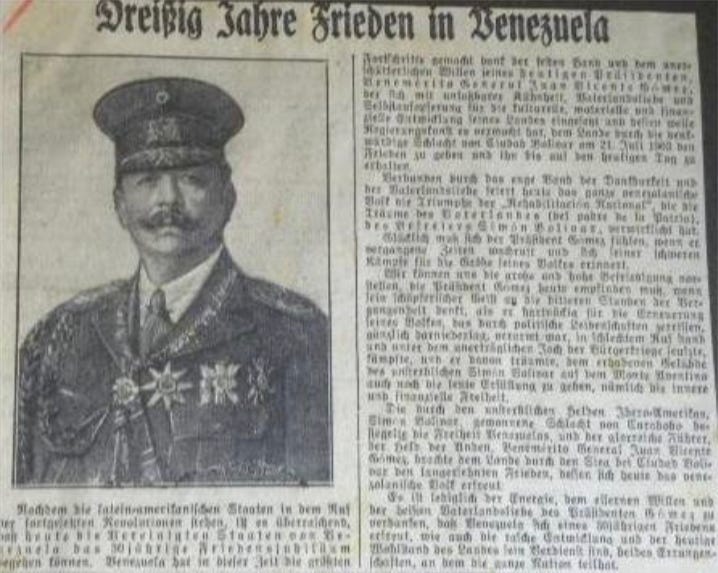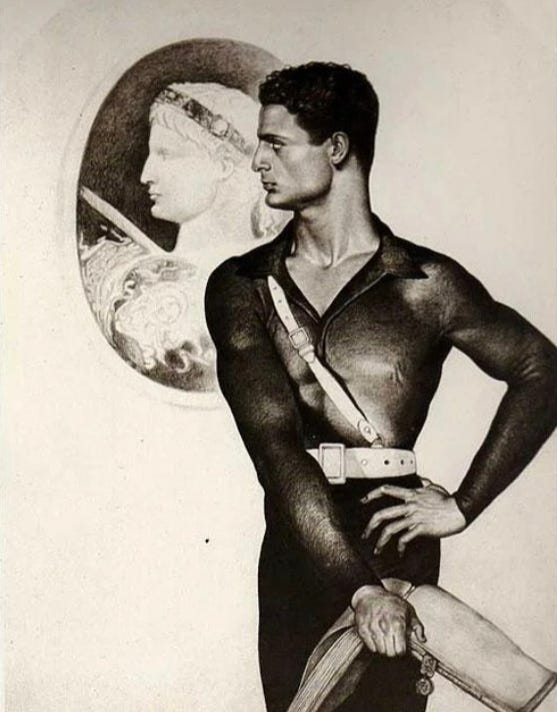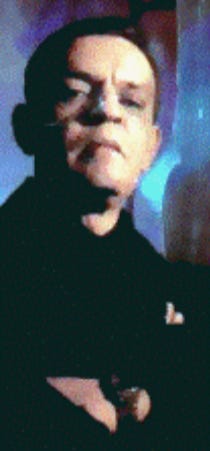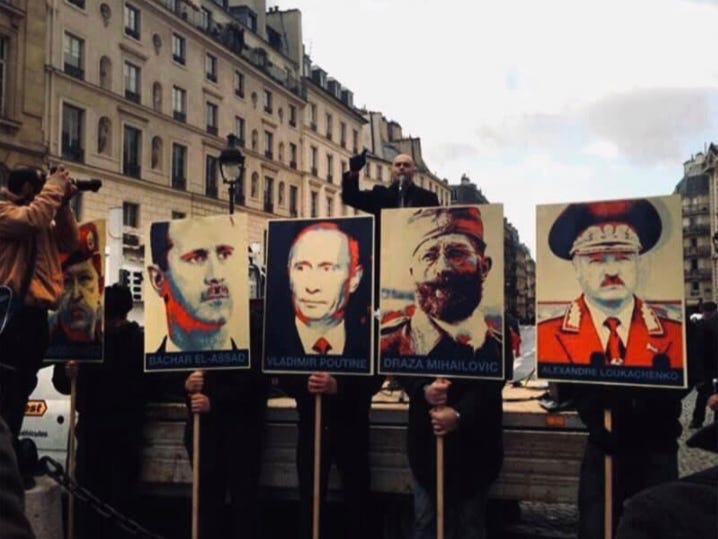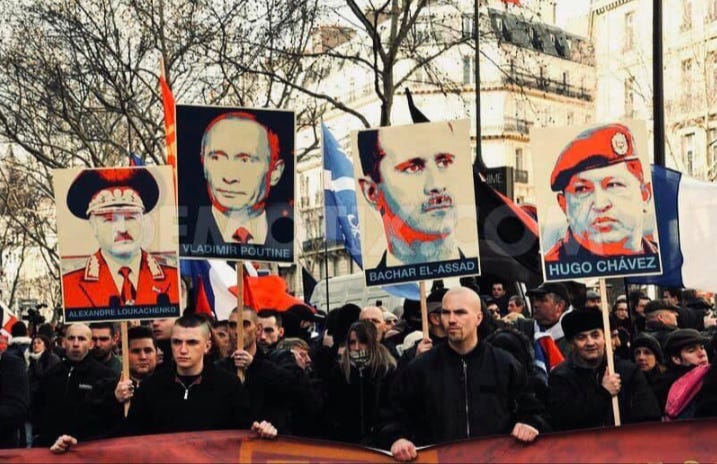A History of Fascism In Venezuela
by Axel de Arco
Gomecismo
In November 1908, President Cipriano Castro departed the country due to health issues, appointing his close associate Juan Vicente Gómez as provisional president. On December 19 of the same year, Gómez seized power in a coup d'état, justifying his actions with claims of a supposed attack by Castro's allies. Gómez's regime was marked by authoritarianism, focusing on suppressing caudillos and stabilizing Venezuela. Additionally, it maintained favorable diplomatic relations with Germany, which began during World War I.
On July 24, 1933, the German press reported on Venezuela's celebrations of the birthdays of General Juan Vicente Gómez and The Liberator Simón Bolívar. Venezuelan Consul Rafael Paredes Urdaneta unveiled a bust of Bolívar in Hamburg. The German Wehrmacht honored Simón Bolívar's birth and acknowledged General Juan Vicente Gómez's birthday on the same day. Rafael Paredes Urdaneta received recognition for commemorating Bolívar's birth and extending well-wishes for Gómez's birthday on July 24, 1933. The press documented the inauguration of Bolívar's bust at the Atlantic Hotel in Hamburg, where Venezuelan diplomatic representatives attended a gala in Bolívar's honor. On December 17, 1935, Juan Vicente Gómez's death was officially announced, attributed to complications from a prostatic adenoma and prostate cancer. Although there were reports suggesting Gómez had passed away two days earlier, his family and supporters chose to announce it on December 17 to coincide with the anniversary of Simón Bolívar's death.
Juan Vicente Gómez counted among his supporters the historian Laureano Vallenilla Lanz, whose renowned work, Democratic Caesarism, captured the attention of Benito Mussolini. Vallenilla Lanz had a son recognized for his role as an ideologist within the Perez Jimenez regime, and a nephew named Pedro Centeno Vallenilla, who gained fame as a prominent homoerotic painter in Venezuela. Pedro presented Mussolini with his painting titled "The Latin Race," and upon shaking his hand, Mussolini expressed his pleasure at "shaking the hand of a true representative of that race."
The Latin Race
Prior to Hitler's rise to power, a National-Socialist party in Venezuela, established by the German community, was known as Landsgruppe Venezolanier der NSDAP. The Venezuelan Nazi party had numerous local branches, showcasing the considerable support the Germans garnered within the nation.
Structure of the party according to the CIA
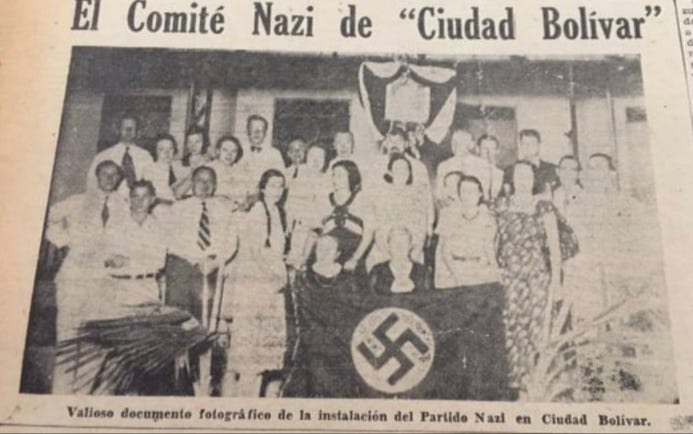

List of NSDAP Supporters
Gustavo Zingg, founder of Zulia Brewery, also appears on the blacklist of US intelligence files as one of the most relevant individuals related to the Nazi Party in Venezuela. There was also a German National-Socialist school, the German School of Caracas (current Humboldt School), which would be closed when the Second World War broke out.
Children from the German School of Caracas, wearing Hitler Youth uniforms
Venezuela maintained friendly relations with both National-Socialist Germany and Fascist Italy.Mussolini, welcomed a delegation of Venezuelan officers dispatched on a Naval Mission to Italy in 1938.
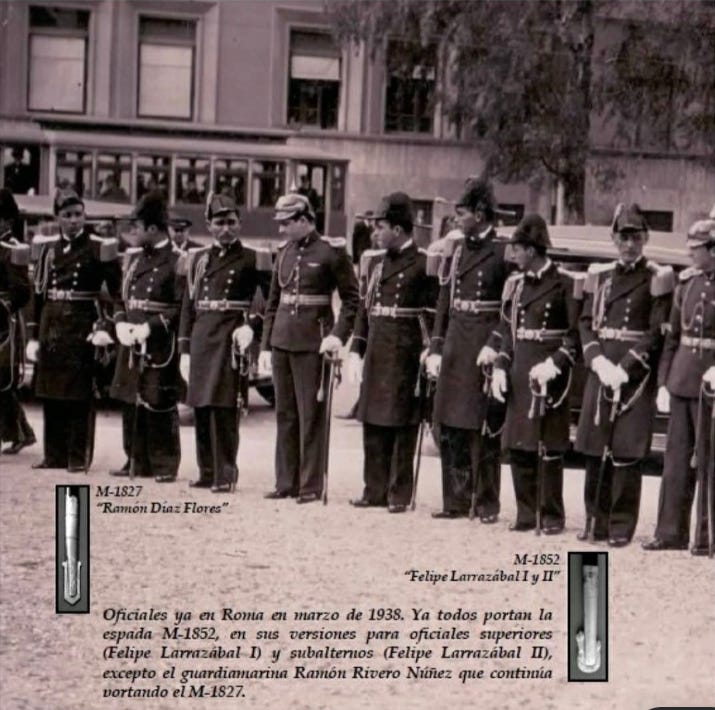

Mussolini welcoming the delegation
In 1934, Benito Mussolini attended the unveiling of a Monument to Simón Bolívar in Rome, where he expressed gratitude to Venezuela for the significant gift, symbolizing their shared Latinity. The report on "Fifth Column Activities in Venezuela" presented in Congress in 1943 referenced an alleged card from the Fascist Movement of Venezuela. Prior to the outbreak of the war, both Venezuelan Presidents Eleazar Lopez Contreras and Isaias Medina Angarita maintained strong relationships with Mussolini. Medina Angarita even acquired two Azio Class gunboats from Fascist Italy, which remained in service until the 1950s.
The Second World War
In 1942, during "Operation Neuland," Germany targeted the Monagas Oil Tanker off the Paraguaná Coast to disrupt oil supplies to the Allies, resulting in the deaths of 31 crew members, mostly Venezuelans. This attack was part of a series, as German submarines targeted Venezuelan ships in the Caribbean while German spies sabotaged electrical substations. Following these events, the Nazi party was banned, and Concentration Camps were set up for spies and Nazi supporters engaging in illegal activities in Venezuela. President Isaias Medina Angarita, in response, established diplomatic ties with the Soviet Union and severed relations with Germany, Italy, and Japan. He froze the assets of individuals holding nationality from these Axis nations. Concerned about protecting Venezuela's oil wells, he sought military assistance from the United States amid rumors of German intentions to seize control of these strategic sites.
Despite being neutral for an extended period, Venezuela eventually shifted its stance on February 15, 1945, when the Venezuelan government formally declared war on Nazi Germany and the Axis Powers. Prior to this pivotal moment, declassified CIA documents revealed suspicions that the renowned writer and key figure of the literary "Magical Realism" movement, Arturo Uslar Pietri, held pro-Axis and anti-US sentiments, attempting to sway President Medina Angarita towards aligning with Germany. Subsequently, Pietri went on to serve as a senator and establish the Nationalist party known as the National Democratic Front (Frente Nacional Democrático). A noteworthy detail is that Ettore Chimeri, recognized as the first Venezuelan to compete in Formula 1, was a member of Squadron 73 in the Royal Italian Aeronautics during World War II, serving in the African campaign.
The Postwar Period
In 1948, Venezuela experienced another coup d'état, this time against the social democratic president Rómulo Gallegos, orchestrated by military leaders Marcos Pérez Jiménez and Carlos Delgado Chalbaud. The coup was presented to the public as the institutional response of the Armed Forces to the threat of political sectarianism and the ongoing unrest caused by those who had squandered the opportunity to act for the nation's benefit. In 1950, Carlos Delgado Chalbaud was assassinated, marking the only assassination of a Venezuelan president. Subsequently, Marcos Pérez Jiménez became president of the governing board and called for elections to conclude the transitional government. Although the Democratic Republican Union party won these elections, when initial results indicated that the party, led by Jóvito Villalba and Mario Briceño Iragorry, was poised to win, the ruling Independent Electoral Front party (endorsed by Pérez Jiménez) disregarded the outcome and appointed Pérez Jiménez as the provisional president of Venezuela.
In 1953, under Pérez Jiménez, Congress ratified a new National Constitution that changed the country's name from the United States of Venezuela, which it had held since 1864, to the Republic of Venezuela. However, some social rights established in the 1946 Constitution were retained. Marcos Pérez Jiménez's government designated the days leading up to July 5 as Homeland Week, aiming to honor national heroes through events that celebrated both the liberators and the government's achievements, thus promoting a renewed sense of national pride.
During Homeland Week, public employees, primary and secondary school students, and some subsidized artistic groups parade in all cities before local authorities, accompanied by marching bands. In Caracas, the president and high state officials preside over the ceremonies. Every December 2, marking the anniversary of Pérez Jiménez's rise to power, the principles of the "New National Ideal" are reaffirmed, significant public works are inaugurated, and the image of the Virgin of Coromoto, declared the patron saint of these celebrations by the government, is honored. Military delegations from various countries in America and Europe also participate in these celebrations.
A photo of Marcos Pérez Jiménez
The New National Ideal is a concept that sets norms for everyone, including the president, other officials, and citizens. This doctrine was first officially articulated by Lieutenant Colonel Marcos Pérez Jiménez, then Minister of Defense and a member of the Military Government Junta, in his closing speech at the Convention of Governors of State and Federal Territories on March 13, 1949.
“We must admit that we have lacked that fundamental element of the life of the people that consists of a clear and precise formulation of a National Ideal, capable of forcing us to an agreement of wills for its full realization. This ideal involves two fundamental forms of collective enunciation: On the one hand, the use of our historical heritage as a source of moral values, and on the other, the appropriate use of the country's natural resources to improve the lot of current Venezuelans, especially that of the least favored and leave future generations a more prosperous homeland. The bases of improvement, as a National Ideal, are rooted in tradition, natural resources, and the geographical location of the nation, in which function Venezuela must have a National Ideal, and the supreme purpose of this ideal is: To achieve for Venezuela to have a position of honor among nations and make a Homeland more prosperous, dignified and strong every day. The objectives of the National Ideal are the progressive transformation of the physical environment and the comprehensive improvement of the inhabitants. The National Ideal generates a doctrine: that of the Common Good, the doctrine generates plans that propose the achievement of the objectives. The Plans generate works subject to the criteria of the doctrine.”
— Marcos Pérez Jiménez, March 13, 1949
The government's economic approach combined elements of Keynesianism and State Capitalism, resembling the system in place in the Soviet Union. Despite this similarity, Pérez Jiménez targeted the Venezuelan Communist party through the National Security Directorate, the police intelligence agency, arguing that they opposed national interests.
He stated:
“I am not closed, nor am I dogmatic, nor do I believe that everything in a political doctrine is good or bad. What's more, I believe that in the end the world will find the final solutions, some coming from communism and others coming from capitalism. [...] You have to be pragmatic and take the best, what best suits the country, what has the greatest reason for being.”
— Marcos Pérez Jiménez quoted in Habla el general by Agustín Blanco Muñoz
In the international context, General Pérez Jiménez advocated for Latin American unity to achieve various objectives, including countering American influence in the region and overcoming what he referred to as the "economic colonialism" of the United States.
“To believe that the United States of America is sincerely interested in the comprehensive development of the Latin American countries, it is essential to be naive of the first magnitude.”
— Marcos Pérez Jiménez, Frente a la infamia
The Pérez Jiménez regime was notable for its migration policy, which primarily encouraged the entry of Europeans, especially from Spain, Italy, and Portugal. In a 1999 interview with Oscar Yanes, Pérez Jiménez expressed his desire to "improve the Venezuelan race." Drawing inspiration from Mussolini, who relocated hundreds of farming families from impoverished Veneto to improve the Pontine Marshes of Lazio, Pérez Jiménez sent an emissary to Latina to persuade its residents to move to Venezuela.
Nuevo Ideal Nacional
On January 1, 1958, Colonel Hugo Trejo led the first military rebellion against Pérez Jiménez. This movement included numerous officers from the Caracas and Maracay garrisons, primarily from the Air Force. Although the uprising was unsuccessful and its leaders were apprehended, it signified the onset of an escalating internal crisis for the regime. By January 22, senior military leaders convened at the Mamo Naval Base and the General Command of the Navy at the Simón Bolívar Center to assess the situation. They resolved to establish a Military Government Junta, which called for Pérez Jiménez's resignation. By that evening, the Navy and the Caracas Garrison had turned against the regime, leaving Pérez Jiménez without support from the Armed Forces. He fled early on January 23 to Ciudad Trujillo (now Santo Domingo) in the Dominican Republic. It was later revealed that the United States had coordinated efforts to destabilize and overthrow Pérez Jiménez's government.
Following the assassination of his protector and increasing political turbulence, Pérez Jiménez relocated to the United States, where he made significant investments. Despite an agreement between Rómulo Betancourt's government and President John F. Kennedy for his extradition to Venezuela, he faced imprisonment for alleged embezzlement, though evidence was lacking. Pérez Jiménez was held in the Caracas Model Prison during his trial and was sentenced to four years in prison. However, he was released immediately, having already spent five years incarcerated awaiting his sentence. He then moved to Spain, where he spent the remainder of his life.
Additionally, Pérez Jiménez was tolerant of fascist movements, such as the Authentic Nationalist Party, a Falangist group founded by former military supporters of his regime.Among other fascist or pro-fascist figures, there is Rafael Caldera. Although Caldera was not very different from his social democratic adversaries, it is well known that in his youth he supported Franco, Falangism and Opus Dei. Even Perez Jimenez's director of national security, Pedro Estrada, testified to having seen him with his arm raised, singing Cara al sol. But Caldera, despite his militant Catholicism, opposed the dictatorship in his last years and during his first and second government, as previously stated, was not very different from other democratic governments. Furthermore, it is not the first time that Falangists radically changed their ideology to Christian Democracy.
Venezuela harbored numerous war criminals, including Finnish individuals Arvid Ojasti, known for torturing Jews and communists, and Aarne Kauhanen, Hitler's bodyguard and head of a concentration camp. Additionally, Gestapo agent Hans Wesemann, notorious for kidnapping Jewish pacifist Berthold Jacob in Switzerland, found refuge in the country. Interestingly, according to reports from the Washington Post and the US National Archives on Nazi War Crimes, Josef Mengele briefly concealed himself in Venezuela, a lesser-known fact.
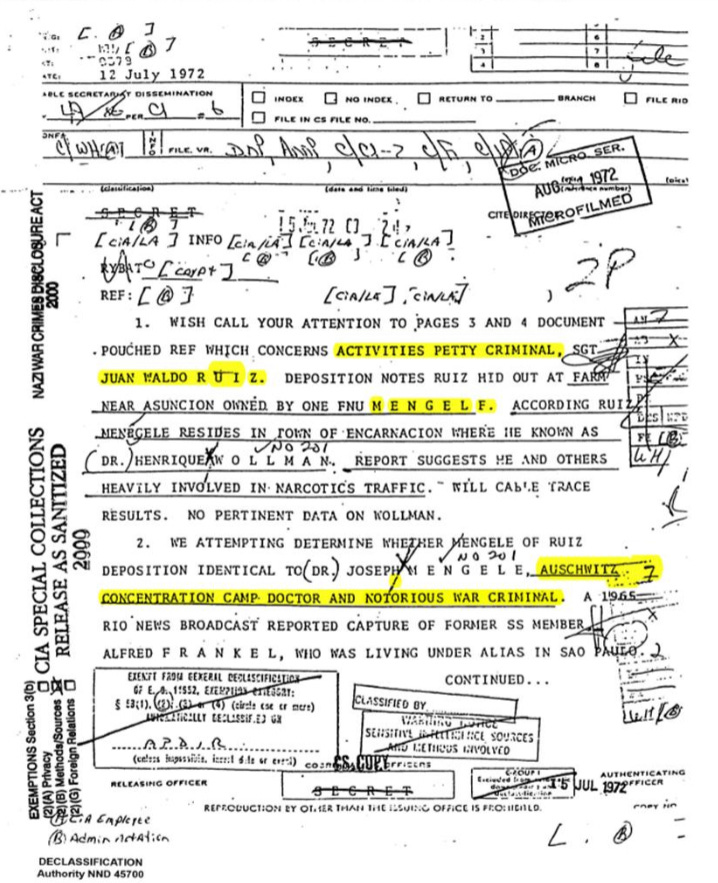
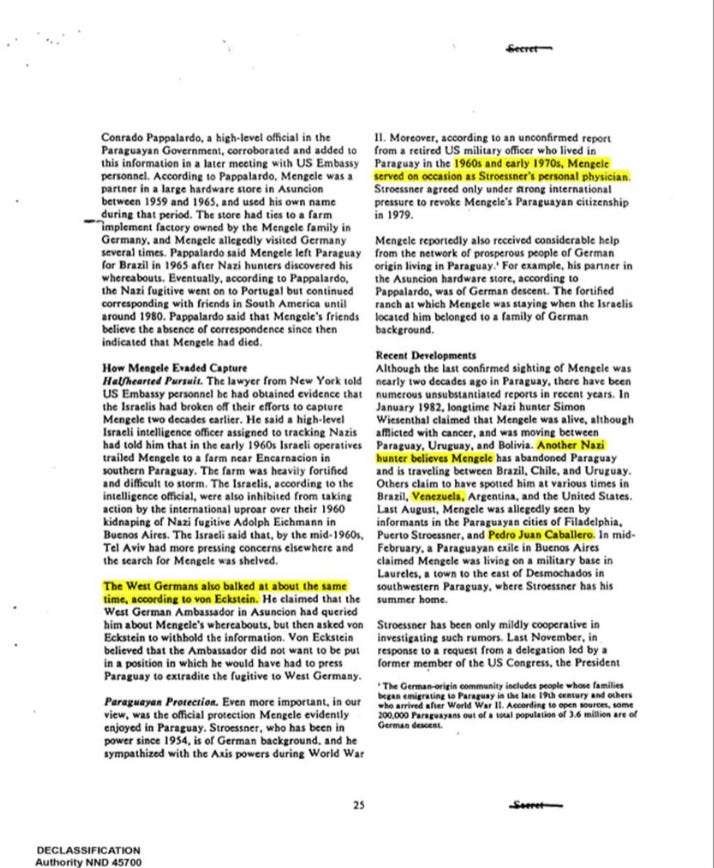
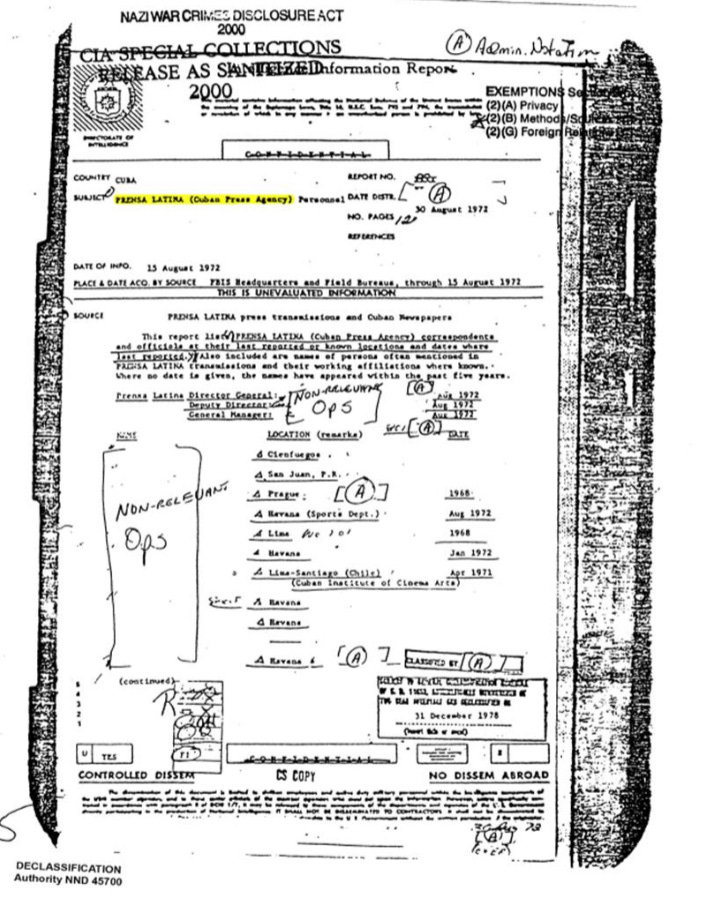

Enrique Parra Bozo, a staunch admirer of Franco known for his Catholicism and anti-communist views, spearheaded the Falangist-influenced Authentic Nationalist party. This group backed Marcos Pérez Jiménez's military regime and made an unsuccessful attempt to field its leader as a candidate in Venezuela's 1963 presidential elections. On the other hand, the sole third-position party in Venezuela was the New Order (NOR) led by Félix Díaz Ortega, with its national headquarters situated on Avenida Baralt in Caracas. The party actively engaged in student, union, and organizational activities in the region.
The party first participated in national elections in 1973, positioning itself as a national party. Despite gaining a few hundred votes that year, its popularity grew significantly in the following years. By 1974, during regional elections, the party received over 10,000 votes, marking its highest achievement up to that point. In the 1988 elections, the party endorsed José de la Trinidad Rojas Contreras as a candidate under the National Coalition for Change, which included the party itself and the Araguaney Independent Movement.
The NOR’s Political Program:
“1. Improve the democratic system by increasing popular participation at all levels of the state.
2. Popular participation is impossible without first acquiring the Federal system.
3. Return the country to the borders of 1811.
4. Make Venezuela an agricultural power; for this, it is necessary to reformulate the Agrarian Reform.
5. Save non-renewable natural resources progressively and rationalize the use of national wealth.
6. Transform each Venezuelan family into the owner of a decent home and eradicate slums in 20 years.
7. Provide free and mandatory education for all residents and Venezuelans up to the age of 18, along with an in-depth review of the educational system at all levels.
8. Reform Public Administration based on the criteria of austerity in management and liberality in investment.
9. Reorient the national economy according to the interests of the majority and demand compliance with the social function of public and private capital.
10. Reorganize demographics territorially and rationalize immigration.
11. Implement a Comprehensive Social Security System that protects individuals from birth to death.
12. Reorder the National Constitution, especially the articles related to economic rights.
13. Institute Compulsory Military Service for all residents of the country without distinctions based on education, social class, minor physical defects, sex, or marital status.
14. Conduct elections through competition in all branches of the Judiciary subject to the Civil Service Law.
15. Enact a Civil Service Law to safeguard Public Administration employees against dismissals for political or unjustified reasons.
16. Establish a National Police and police forces in each entity, protected by the Civil Service Law and federal security legislation.
17. Enact a Federal Security Law to comprehensively defend the National Territory, guaranteeing the life and property of residents with strict adherence to Human Rights.
18. Maintain an international policy of absolute independence from the interests of other nations and establish relations based on national interests, regardless of prevailing political systems.
19. Eliminate official or private monopolies and oligopolies; create parallel companies during emergencies.
20. Ensure the utmost freedom of expression, commerce, profession, and industry with limitations only for the common good.
21. Develop and execute a national public transportation policy in collaboration with private companies, users, and regional and national governments.
22. Construct a 50,000 km railway network.
23. Mandate work or study for individuals aged 16 to 60; guarantee access to work and study, ensuring children live their lives as children and not premature workers.
24. Gradually eliminate privileges and deductions from certain official sectors that foster discrimination, protecting broad segments of the population from economic or political vulnerability.
25. Establish a multidimensional democratic system capable of providing political, social, and economic democracy to the country.”
— NOR - New Order Authentic Nationalism Party (https://venezuelanacionsocial.blogspot.com/2009/02/nor-partido-nuevo-orden-autentico.html?m=1)
In 2001, NOR joined movements opposing Hugo Chávez's government in protests. The party was later dissolved in 2002 through an administrative decision by the National Electoral Council. Díaz Ortega 's favorite books included Mein Kampf by Adolf Hitler, The Art of War by Von Clausewitz, Thus Spoke Zarathustra by Nietzsche, and Heroic Venezuela by Eduardo Blanco. He was involved in the bombing of the Los Monjes Archipelago in the Caribbean Sea, Venezuela, to aid in reclaiming sovereignty over the islands. For his actions, he received honors and a promotion from President General Marcos Pérez Jiménez.
Additionally, Díaz Ortega took part in the 1960 military uprising against President Romulo Betancourt's government. Following the failed coup, he fled to the United States, settling in Louisiana. While there, he briefly engaged in advertising work and connected with various nationalist groups such as the John Birch Society, the American Legion, and the American Nazi party. Upon his return to Venezuela in 1963, he became involved in the Social Nationalist Movement and joined the electoral coalition backing Arturo Uslar Pietri's presidential candidacy. Díaz Ortega enrolled in the Faculty of Medicine at the Central University of Venezuela, establishing a branch of the Social Nationalist Movement on campus. This group engaged in confrontations with hippies and communists who frequented the university halls leading to Los Caobos Park, which was wooded at the time.
One of the few photos there are of Félix Díaz Ortega
President Hugo Chávez also showed sympathies towards fascism, as evidenced by his association with the Holocaust denialist writer Norberto Ceresole. However, Ceresole parted ways with the Chávez administration following a violent altercation with Vice President José Vicente Rangel. A self-proclaimed Peronist, Ceresole supported the right-wing military figure Aldo Rico during the 1987 "Carapintada" Rebellion against Raúl Alfonsín. He served as an advisor to the leaders during this coup attempt. While in Madrid, Ceresole held the position of president at the Latin American Institute for Technological Cooperation and International Relations (ILCTRI). He began collaborating with the neo-fascist Social Republican Movement from its inception and also led the Madrid-based magazine Defensa y Sociedad.
Norberto Ceresole and Hugo Chávez
Ceresole was not the only individual with fascist sympathies connected to Chavez. Serge Ayoub (Batskin) participated in a demonstration against imperialism and globalization in February 2013 with "Troisième Voie" and the "Jeunesses nationalistes révolutionnaires." Following legal challenges, these groups disbanded. Ayoub emphasized that his decision to disband was made out of a sense of personal honor rather than succumbing to external pressures. Ayoub stated that he dissolved the organizations as a matter of personal integrity rather than allowing external forces to dissolve them. The demonstration featured flags from Syria, France, Russia, Venezuela, Serbia, and Cuba, along with images of leaders like Bashar Al Assad, Vladimir Putin, Aleksandr Lukashenko, Hugo Chávez, and Draža Mihailović.


